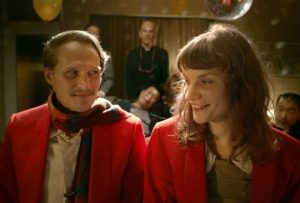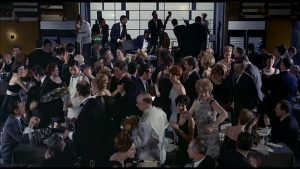Importance of a Good Party
From La Règle du jeu to Kiss Kiss Bang Bang, the party scene has been a staple of film. They work best when they transcend base escapism in service to character and narrative. While not at all a unifying theory, good parties, the parties that transcend the regular Saturday get-together, act as a furnace in which to create relationships, they act as gates into a different world (acting as escapism), and they act as trials through which we can progress and develop.
In Tobias Nölle’s Aloys (2016), winner of the Fipresci Prize at the 2016 Berlinale, the party scene does all three. The film follows a middle-aged private investigator as he deals with the loss of his father and business partner. He is self-isolated from the world, interacting with it only as an observer through the video surveillance he collects for his clients. One day, his equipment and tapes are stolen, and it becomes apparent that he is not only observer, but also subject. A mysterious woman calls to blackmail him into playing a Japanese imagination game called phone-walking, whereby participants inhabit a shared imagined world. Aloys opens himself up to her voice, while also delving deeper into their complicit illusion. This narrative device allows Nölle to explore the line between fantasy and isolation, as well as the aesthetics of such. An excellent scene is when Aloys is walking through a verdant forest, telephone in hand, extending out of frame. The festivities reaches its crescendo when Aloys, with the help of the woman on the phone, Vera, hosts an imagined party. Aloys lives in a colorless world. He lives in a drab industrial flat and spends his time either in his Spartan apartment or watching others from the bushes at night. The party is an explosion of color. Aloys and Vera wear matching red suit jackets, the apartment brightens, and balloons appear as Aloys’ piano playing becomes a klitche organ party theme. At the same time, major character development is occurring. The party is a small gathering, made up of the functionaries of Aloys life, the people he briefly, if ever, interacts with; the funeral director he met when his father died, a client, the owner of the Chinese restaurant that he always orders take-away from. Through the festivities and Vera’s encouragement, Aloys opens himself up to those around him, albeit through the illusion of a party.
The cinematic power of the party in Aloys is made stronger by the slow burn of the film. The film takes the first half to establish Aloys’ world, in drably colored still shots and almost no noise, save for when he plays back his secret recordings. Aloys does his work alone and at night. The party is a measured development of color and scope. It begins with Vera’s yellow stockings and her ‘playing’ Aloy’s piano. In actuality she describes herself beginning to play song that she saw Aloy’s father play on one of the stolen tapes. Soon, Vera and Aloy’s collective imagination revs up and the few recognizable faces of Aloy’s life enter with balloons, sparklers, and champagne, as the music soars.
Another film that benefits from its slow burn is Jacques Tati’s Playtime (1967), shown at Edinburgh International Film Festival in glorious 70mm. Tati spends the first two thirds of the film following Monsieur Hulot around a stripped down and labyrinthian Paris, stark in its modernity. Eventually Hulot and the American tourists his path criss-crosses arrive at a brand new swanky modern restaurant during its opening night. Just like Aloy’s isolation, it is during the party that Playtime’s precision cut facade falls away. Nothing in the restaurant seems to work, from its glass doors to its modernist styled chairs, leading to lot of great gags. The party crescendos until part of the ceiling collapses , creating something of another wall, in which Hulot, Barbara, and a rich American spendthrift create their own party within a party. The jazz band is excellent, but it is not until things truly fall apart, that the trials of the party begin. Playtime is less about Hulot than an exploration of modernity and consumerism in Paris. The party’s trials do less to change Hulot or Barbara then to challenge the straightlaced collective community within the restaurant, forcing them into a liberated drunken frivolity. The party’s degradation also forces the participants into a new world, one devoid of swanky new technology and timed out intersections. In addition, the party makes fast friends of many; Hulot, the American women, the rich American, the old singer. All are equal in the festivities. When the doorman is no longer capable of curating who can and cannot enter the expensive eatery, all different classes begin to mingle. This is evidenced by when some of the rich patrons help to prop up a blue collar worker at the bar who cannot stand due to inebriation.
Both films take full advantage of diegetic sound. Aloys is having a great time playing piano with Vera, and you can gauge how out of control the Royal Garden is getting by the disconcert on the faces of the house band. It connects the music and party to the story. Many films merely use party music to create atmosphere and mood. Meg Ryan’s Ithaca (2016) is an OK, if predictable, period piece, but the main criticism is of when it cuts out the obviously diegetic music from a house party to bring in an emotional score, as if the house band had decided to stop playing just because the host received some bad news in the other room. Diegetic music avoids the montage that so many modern films containing party scenes have. Kids in Love (2016) is almost entirely montages of too-beautiful teenagers dancing to an upbeat soundtrack. For a movie about bohemia, it makes their lifestyle look escapist, but just as meaningless as a 9-5er’s.
Thematically, Aloys’s party is the stronger of the two. While the Royal Garden gets far crazier, the escalation in Aloys is by Aloys’ design. As the festivity heightens, Aloys opens himself up more to Vera and life. Character development during a party is important. Going to parties is a popular pastime, in fact music festivals is are a booming business. You may have fun at a party; lose yourself in the music and the alcohol. You might even make a connection with someone, go home with them. But, without any type of development, they quickly become meaningless.
Comments are closed, but trackbacks and pingbacks are open.